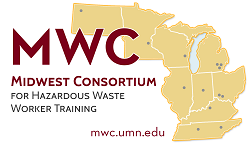Principal Investigator / Institution
-

-
Peter Raynor, Ph.D.
-
Tel 612-625-7135
[email protected] -
University of Minnesota School of Public HealthDivision of Environmental Health Sciences420 Delaware St. SE, MMC 807Minneapolis, MN 55455
Program Contact
-

-
Jennifer Meyer
Project Coordinator - [email protected]
-
University of Minnesota School of Public HealthDivision of Environmental Health Sciences1260 Mayo Memorial Building420 Delaware St. SEMinneapolis, MN 55455
Program Description

The Midwest Consortium for Hazardous Waste Worker Training (MWC) (MWC) facilitates adult-based, action-oriented, results-centered worker and community training with a goal to build capacity among workers to improve health and safety in their workplaces and for communities of workers and residents to recognize, prepare for, and recover from environmental exposures. Programming is delivered by 13 training centers in 9 states: Illinois, Indiana, Kentucky, Michigan, Minnesota, North Dakota, Ohio, Tennessee, and Wisconsin. MWC training centers include labor-affiliated programs, three major universities, two community colleges, an historically black university, an affiliate of a national youth training organization, a tribal nation, and several community-based organizations, all of which form partnerships locally and regionally to build capacity among trainees to recognize and react to hazardous substances in their workplaces and communities. The experienced, creative, and dedicated trainers at MWC centers have successfully trained hundreds of thousands of workers since 1987, increasing their collective training output over time and demonstrating important impacts.
Hazardous Waste Worker Training Program (HWWTP)
Throughout the region it serves, the MWC HWWTP protects and improves the health and safety of site workers, TSDF workers, emergency responders, and community members by building their capacity to identify and remediate hazards and increasing their preparedness for and resilience during natural disasters and other emergencies. MWC training centers deliver interactive, hands-on training programs using dozens of course curricula developed and maintained by the MWC. These programs leverage not only the resources of the National Institute of Environmental Health Sciences, but also of other U.S. government agencies, including the Environmental Protection Agency, the Occupational Safety and Health Administration, the National Institute for Occupational Safety and Health, the Agency for Toxic Substances and Disease Registry, the Department of Transportation, the Department of Homeland Security, and the Chemical Safety and Hazard Investigation Board. The MWC HWWTP will continue to develop training innovations and integrate them into new and existing programs, implement new model training programs related to opioids and worker health, and strengthen and extend existing locally relevant resilience projects created at each training center. Achieving these aims will be enabled by providing resources for centers to form partnerships with trainees from underserved populations and ensuring continual evaluation and improvement of the delivery of the MWC's worker and community training.
Project Duration
- August 13, 2020 - May 31, 2025 (HWWTP)
Grant Numbers
- U45 ES006184 (HWWTP)
Other Participating Organizations
- Cincinnati Interfaith Workers Center (http://www.cworkers.org/)
- Citizens Environment Alliance (http://www.citizensenvironmentalliance.org/)
(https://www.fisk.edu/)
- Green Door Initiative (http://greendoorinitiative.org/)
- Ivy Tech Community College (https://www.ivytech.edu/32485.html)
- Lakeshore Technical College (https://gotoltc.edu/business-industry)
- The Three Affiliated Tribes (http://www.mhanation.com/homeland-securityemergency-management)
- University of Cincinnati Evaluation Services Center (https://cech.uc.edu/about/centers/evaluationservices.html)
- University of Illinois (https://lep.illinois.edu/hazmat-training/)
- University of Minnesota (http://hazmat.umn.edu/)
- University of Tennessee (https://www.cis.tennessee.edu/health_safety)
- YouthBuild Louisville (http://hazmatky.com/)


